Risk! Risk anything! Care no more for the opinions of others, for those voices. Do the hardest thing on earth for you. Act for yourself. Face the truth.’ – Katherine Mansfield
Kiran Dass of WORD Christchurch informed us that 2023 marks 100 years since the death of Katherine Mansfield, whose words, work and life were a call to action, writ large. How would the assembled writers of the gala line-up use this statement as a springing off point? What stories and provocations would we hear? How might their different perspectives find voice?
That you never can predict what you'll get with this event is a huge part of its appeal for me. It's like a mix-tape of widely different musical genres - will the next song on the playlist be death metal or electronica? You can hazard a guess but you never really know.
Providing the tracks on the playlist were Gabriel Krauze (UK), Kevin Jared Hosein (Trinidad and Tobago), David Keenan (Scotland), Meg Mason (Australia/ New Zealand) and Daisy Speaks (New Zealand/Samoa) (standing in for Tusiata Avia aka The GOAT* who was unable to attend).
Kevin Jared Hosein
The first speaker to the lectern was Kevin Jared Hosein and I was immediately taken with his Caribbean accent. All mellifluousness and sing-songy intonation (this is much the way I feel about a Welsh accent too). His challenge to the audience was simply to imagine. Imagine growing up on a different island. A Caribbean one, where there are no publishing houses, literary prizes, or poet laureates, and most towns don't have a public library. Acquiring books is a matter of finding whatever tatty volume you can for sale (not in a bookstore, possibly at a market) - a copy of The Gunslinger by Stephen King with half its cover missing - or, spending half an hour illegally downloading a copy of a novel via Peer 2 Peer networking (eating 1/40th of your monthly internet data).
How mad must the dream of being a writer be in such circumstances?
And then when you do, and you finally get past wanting to write stories set "at the top of a ferris wheel on Coney Island" because that's the only kind of writing you've been exposed to, your stories, culture and name are too foreign and unfamiliar to be paid much attention because ultimately it's books that appeal to American and British women (the women of bookstagram and book clubs, and yes, literary festivals) that decide what's marketable and sellable in the publishing world.
The worst thing is not to be told no, or that you're not good enough but rather to be roundly ignored.
The most terrifying thing might be to write into the void.
This idea of a certain kind of person dictating which books get published and which books get attention makes me think about our own version of this in Aotearoa, and particularly which Māori stories are palatable and therefore the most successful (The Bone People, Once Were Warriors, Auē - what do they all have in common?)
Meg Mason
Meg Mason was all kinds of funny and self-deprecation setting up a satisfying joke from the outset, claiming that she wanted to read a passage from her "first novel" of domestic ficion but couldn't decide which part so will read the whole thing. This turns out to be a "story" of one sentence projected onto the screen behind her and written in a childish scrawl.
I loved you said Megan to mum in the houze
Happily, she noted, this work is not autobiographical - she still loves her mother. With such a promising start, why was it that it took Mason until the age of 37 to become a novelist, and several years later to become a good one?
More than the other writers on the night, Meg Mason really leaned into the Katherine Mansfield-ness of the brief on risk, capturing that idea of her as:
... an impossible rarity... a woman who wasn't trying to be good.
Not "good" in the sense of "a good writer" but "good" in the sense of "a good woman". Mason herself does not identify as a risk-taker and has attempted versions of being good, doing her time on the frontlines during "The Mummy Wars" of the early 2000s. The "frontline" being "at home" with the supposed "good mummies".
She admits to not envying Mansfield much. After all, "...the short story format is so restrictive... even when you're not coughing up blood..."
I want to say I felt bad laughing at this joke... but I did not.
So what in Meg Mason's self-avowed "deeply conservative life choices" makes her qualified to speak on the topic of risk? Well, it's the writing, isn't it? Forever and always, that.
Calling publishers about her book that she absolutely hadn't written yet was a risk. That it was a risk that paid off doesn't make it any less of one. And the writing itself is "the ultimate courting of humiliation". She was terrified of not being to anyone's taste and even after Harry Styles was seen reading her book on a super-yacht, what about the next one? Apparently if you complain about this to literary phenom Ann Patchett, she replies with "It's literary fiction, Megsy - no one gives a s***." Amazing.
But under all the pithy quotes and jokes, Mason's final idea was this: sometimes it takes a long time to get to the point where you can write. Sometimes you're busy taking care of small humans. Even Katherine Mansfield struggled with domesticity:
The house seems to take up so much time...
Ain't that the truth, KM. Ain't that the truth.
But according to Mason, it's okay. Things will percolate during this time, "cherish your boredom" as things will keep building, building... until it explodes. In the meantime, plan your work while you're waiting.
David Keenan
Where other writers stayed at the lectern, David Keenan strode out onto the stage and walked about the stage in the manner of a stand up comedian, all curly moustachioed energy and storytelling vim. He opened by explaining that his father had been illiterate and because of this had instilled a respect for the power of the word and books in young David. "Books," he had said to his son, "will change your life."
"How the f*** would you know?" had been Keenan's incredulous response.
His father had this faith in books as transformative things but Keenan is quick to point out that if his dad could've read he'd probaby have been disappointed as novels mostly don't change your life, so he has attempted to write books that might stand up to the high expectation of illiterate readers.
He went on to tell a story of how on his father's passing the caul his father was born with, known as a "lucky cap", was passed onto Keenan and it was something he treasured and carried with him. Folklore says that anyone who has a lucky cap on them cannot drown and in days gone buy they were much sought after by sailors. Keenan explained how after a rowdy night out in Durham (attending the Gordon Burn Prize ceremony) he briefly lost the cap and was distraught, only to find it again outside his hotel room door. But then on his way to meet his editor, crossing the bridge by Durham Cathedral he heard a voice say "throw your father away" and so, without thinking, he threw the bag containing the lucky cap in the river.
He immediately regretted do so but was then struck by the revelation that his father could not drown, and is therefore "...alive in ever waterway of the world". Later, on a trip to Mexico he looked down at the ocean and thought, "there's my dad". So in releasing himself from the physical object that represented his father he allowed himself a different way of "communing" with him.
And when he returned to Durham the following year for the Gordon Burn Prize again, this time he won for novel For the good times which he'd written about his father and his brothers.
Daisy Speaks
Daisy Speaks, as mentioned above, was a late addition to the line-up but brought her own affecting story of words and poetry and purpose.
Daisy grew up in a religious background and recounted how as a kid she'd been drilled in learning passages to recite in church and her father's insistence that his children be diligent in their efforts because "the way you do one thing is how you do everything". There was "an incredible respect for words... well-weighted and intentional" and the performance aspect of church, both for herself and in watching and listening to others was a formative influence. Plus Tupac. And Biggie, "etched into the Sony Discman of my young mind".
She also spoke of the not-having of things. That if you've never eaten tomato sauce sandwiches, then you probably don't get it. Her kids certainly don't and that's a good thing, but also do they appreciate what they have as much?
At various points she performed some of her poetry, moving out from behind the lectern and I have scribbled in my notebook "She's SO COOL!"
She also talked about that thing that happens when you achieve at school, as a brown girl. The worry that you will need to assimilate and leave parts of yourself behind in order to achieve?
I was impressed by Daisy's drive - the desire to lift up others with "your words, wallets and works". Possibility is risk. Levelling up, being bold, better knowing yourself. Be unafraid.
Gabriel Krauze
Last to the lectern was Gabriel Krauze and his whole speech was a provocation. His message? Stop wanting to be comfortable.
He started off with a photo of a painting by Caravaggio on the screen.
This painting, Death of the Virgin (1606), represents a radical, more truthful portrayal of the death of the Madonna than was acceptable at the time. Indeed, it was rejected as "unfit". Why? Because the model used for the Madonna was a prostitute. Because she's draped in red and not blue. Because you can see her legs. And because we see her surrounded by grief, rather than her floating beatifically into the sky while her friends and loved ones stare up in awe at the glory of it all. It looks like a real person has died and real people are sad about it and that "truth" was not palatable to the Church in the 17th century.
And so it is with the publishing industry which, he claimed, is not interested in challenging its customers. In this sense, Krauze was treading familiar ground - Hosein having already touched on this idea.
Krauze questioned why readers need stories to have some moral resolution, characters with redemptive arcs so you can "swoon over their vulnerability".
If all you can imagine is joy and hope then you are disconnected from reality.
Yes, there is beauty in the world but there's also ugliness and brutality and Krauze seemed to be disdainful of writers (and readers) who feel the need for there to be an uplifting angle on an otherwise dark story. To him this doesn't reflect reality. There's a sense that he finds this lazy and lacking in intellectual rigour. While I understand what he's saying... sometimes you just want to read a Jojo Moyes and enjoy it, you know? Did I mention Gabriel Krauze is quite intense?
He was also somewhat dismissive of how words are used, in particular when people talk about speaking "their truth", he declared, "the truth doesn't belong to anyone". This got a bit of a laugh but I know rhetoric when I hear it, Mr Krauze. Similarly his assertion that the term "lived experience" doesn't mean anything - "you either have an experience or you don't". Another laugh, but again, these are rhetorical tricks. I know. I've used them myself.
That said, I'm on board with his general thesis (this, of all the talks at this event, was the most like a lecture) that we have to not turn away from the darkness in humanity. We have to be brave enough to face that in ourselves as well as in literature. But also, I use fiction as an escape from the realities of life. I don't consider that a moral failing or that I'm lacking in intellectual rigour because of it. But maybe it's a question of balance? You can't have one without the other... but the other doesn't sell as well.
His next novel will be based on the 2 months he spent in Ukraine recently and will look at the reality of war in all its ugliness. I would not expect there to be many jokes in it.
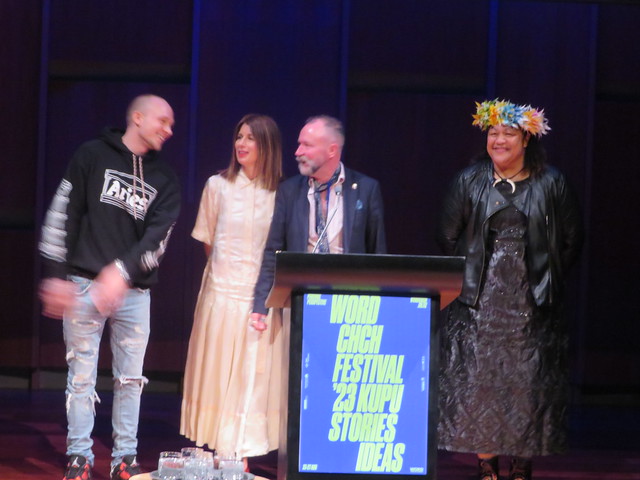
And with that the evening came to a close and while I packed up my notebook I could hear the people around me chatting to each other "really, really excellent", and "food for thought" were two comments I caught.
It was a very eclectic mix-tape, that's for sure.
Find out more
- WORD Christchurch website and 2023 programme
- Follow @WORDChCh on Twitter
- Follow WORDchch on Instagram
- Like WORD Christchurch on Facebook
- Our WORD Christchurch 2023 page
In the catalogue
*Greatest Of All Time (Daisy Speaks paid mad respect to this local legend)

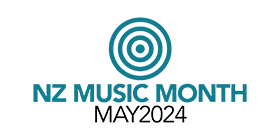
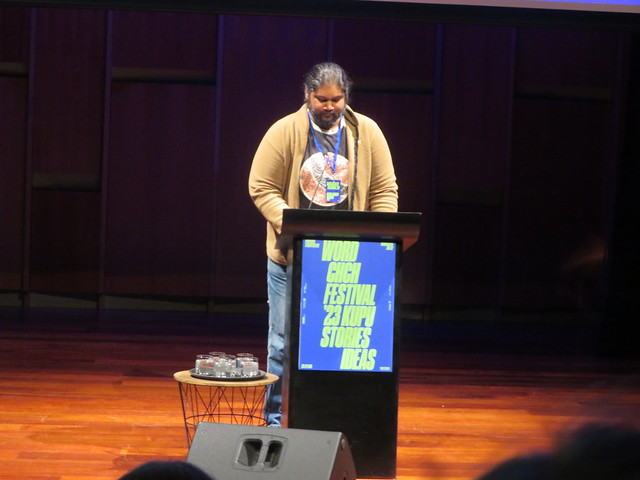
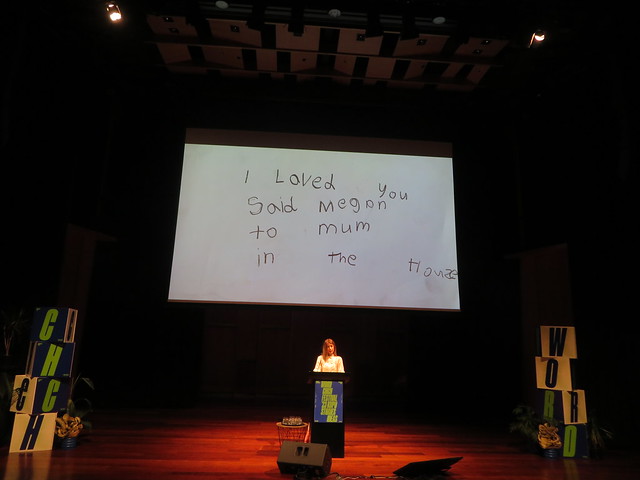
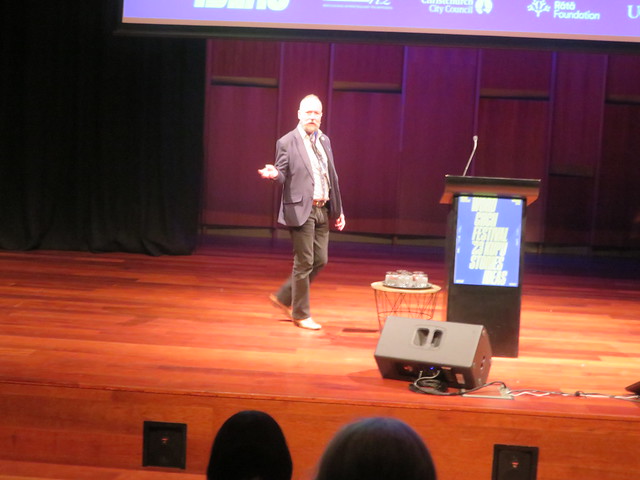
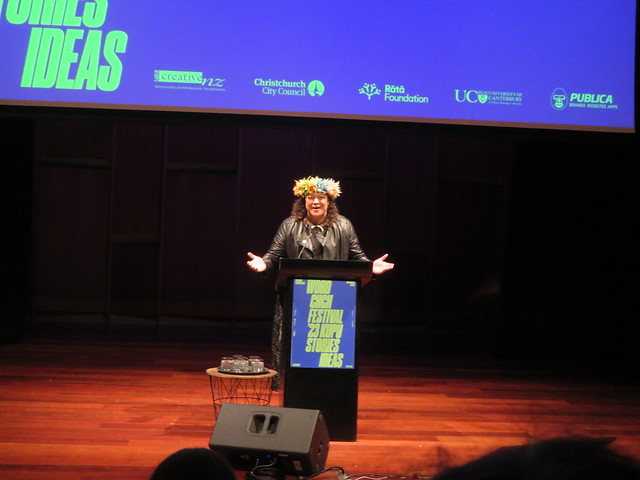
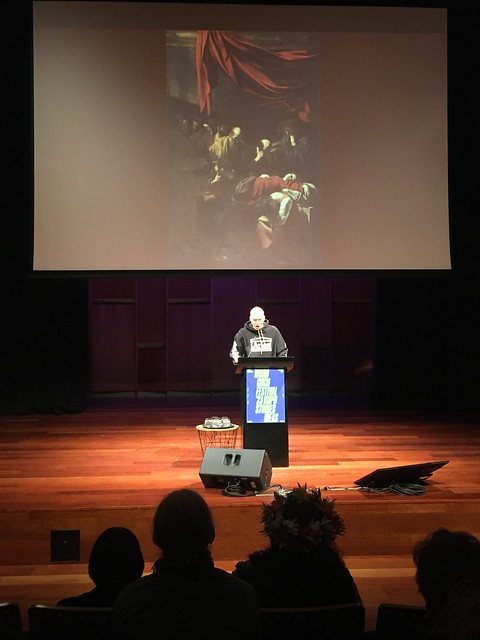


Add a comment to: WORD Christchurch 2023: Risk! The WORD gala